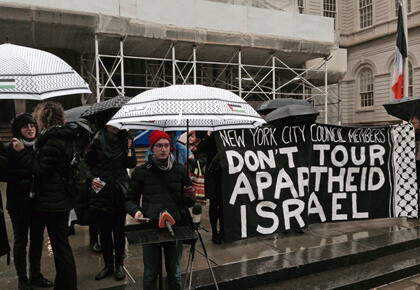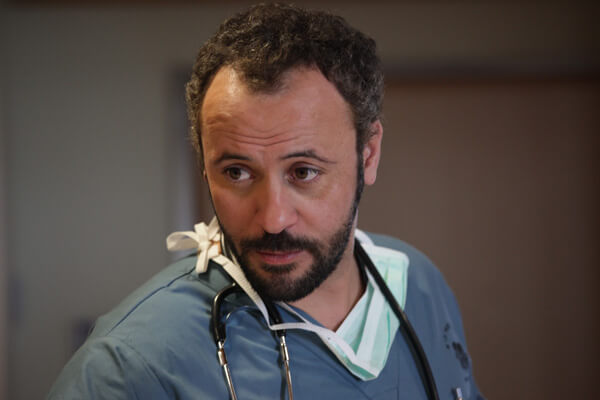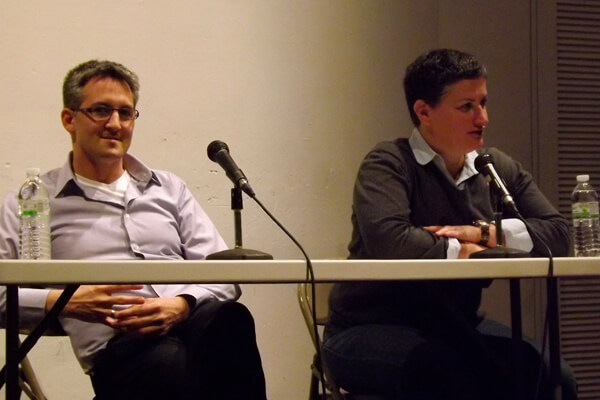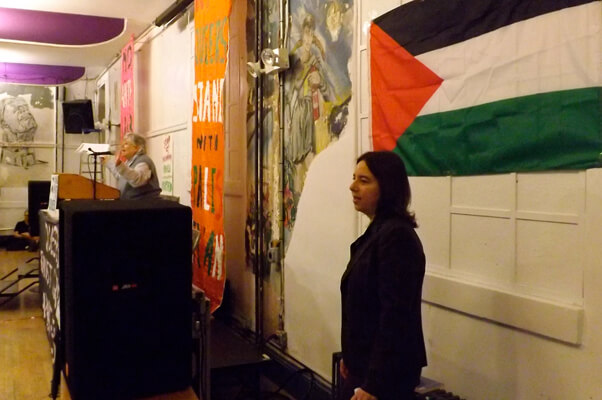Mosab Hassan Yousef and Gonen Ben Yitzhak in Nadav Schirman’s “The Green Prince.” | MUSIC BOX FILMS
The Green Prince,” a documentary by Israeli director Nadav Schirman, is bound to get sold as a heartwarming tale of Israeli-Palestinian friendship. Nevertheless, its depiction of the close relationship between Mosab Hassan Yousef, the son of Hamas’ founder, and Gonen Ben Yitzhak, an agent in Israel’s security agency Shin Bet, pivots around multiple betrayals. The two men never let each other down, but at various points in the film they’re held out to dry by Hamas, the Israeli government, and their own families. If one sees a sign of hope in the film’s depiction of their friendship, it’s a very limited one. Individual goodwill can only go so far, even if Gonen really gets Mosab out of a jam near the film’s end, in a situation as riddled with systemic failure as the Israeli-Palestinian conflict.
The teenage Mosab’s loyalty to Hamas was firm. At 17, he got involved in a gun sale for the organization, but he got caught and sent to jail for the first time. While imprisoned, he was approached by Israeli intelligence about spying on Hamas for their behalf. He initially refused and went on to serve his time in a wing of the jail controlled by Hamas. Witnessing Hamas members torturing other inmates for real or imagined collaboration with Israel turned him against the organization. When he was freed, he became fully disenchanted, especially with the use of suicide bombings as a frequent tactic. He reconsidered the Shin Bet’s offer and got involved with his handler Gonen.
As a director, Schirman favors a fairly bare-bones style. That led Variety critic Rob Nelson to accuse the film of being “uncinematic.” For me, the worst aspects of it are precisely those that struggle to be “cinematic.” It’s based around extensive interviews with its two subjects, who speak fine, accented English. They’re interviewed in separate rooms, attractively lit and framed. Less happily, Schirman relies heavily on reenactments, shot in black and white and designed to look like footage from a drone. Frankly, this feels cheesy at best and an indulgence in paramilitary chic at worst. “The Green Prince” also makes more sparing use of archival film, including Mosab on an undercover mission in Ramallah.
Nadav Schirman documentary takes a personal look at hurdles in way of Israeli-Palestinian understanding
Mosab’s dilemma is political, existential, and familial. No one can choose who their father is, what ethnic group they are, or where they’ll be born. Being the son of the founder of Hamas made the usual challenges of adolescence all the more painful for him. At first, he seemingly accepted its ideology passively, but his stay in jail led him to embrace liberal humanism (though it’s important to qualify that description by noting that his blog, last updated in 2012, suggest his politics roughly correspond to those of an Israeli conservative). The problem is that he was in no position to openly move away from Hamas — he couldn’t become a humanist without betraying his family.
The film seems to think it was a good idea that he worked as a spy for Israel, as will the majority of its American audience, but it also conveys the full, terrifying weight of his betrayal. He eventually emigrated to the US. It’s no wonder that he couldn’t find a home either in Israel or the Arab world, and not just for obvious reasons of safety.
More than other documentaries, “The Green Prince” has often been compared to narrative films about espionage. It reminded me of a John le Carré novel. Its very talkiness projects a literary quality; one can sense its origins in Mosab’s memoir, “Son of Hamas.” For some, like critic Nelson, this luxuriating in words is a defect. However, Mosab is a magnetic speaker and his life story is an extremely dramatic one. Some might see it as an example of Arab — or at least Palestinian — self-hatred, but his willfulness shines through in his eyes and voice. He may have been manipulated, but he knew exactly when it happened and who was doing it, and he didn’t like it one bit.
The American release of “The Green Prince” coincides with the eruptions of war between Israel and Hamas once again. Chronic hostility between them makes the film eternally topical — unless somehow a lasting peace can be achieved — but it seems particularly relevant now. But this isn’t “Let’s Be Cops,” which inspired a brilliant essay by critic Wesley Morris about Ferguson, Missouri, and movie cops — and a lot of half-assed editorializing by lesser writers. The truths “The Green Prince” reveals about family, friendship, and betrayal don’t only matter on the West Bank and its artistry will live on even if peace between Israel and Hamas is eventually accomplished.
THE GREEN PRINCE | Directed by Nadav Schirman | Music Box Films | Opens Sep. 12 | Angelika Film Center, 18 W. Houston St. at Mercer St. | angelikafilmcenter.com/nyc | Lincoln Plaza, 1886 Broadway at 63rd St. | lincolnplazacinema.com



































